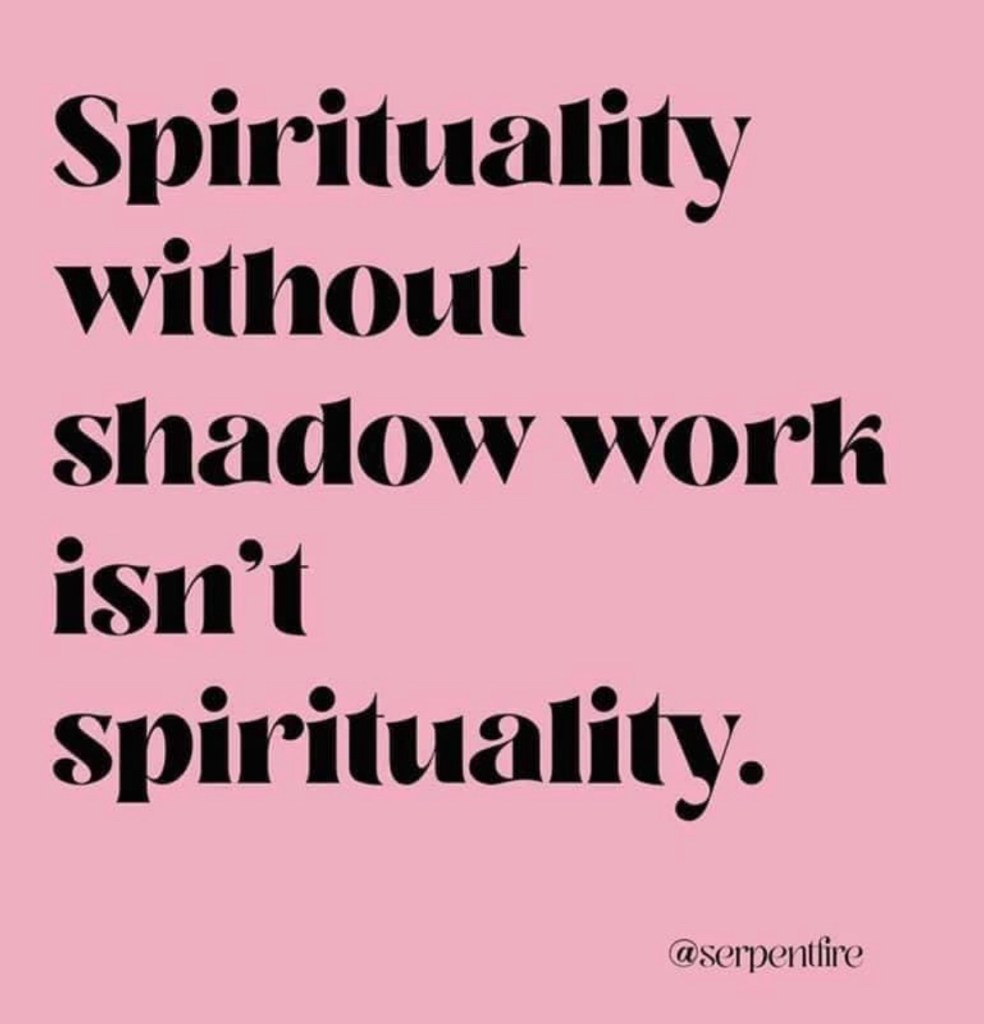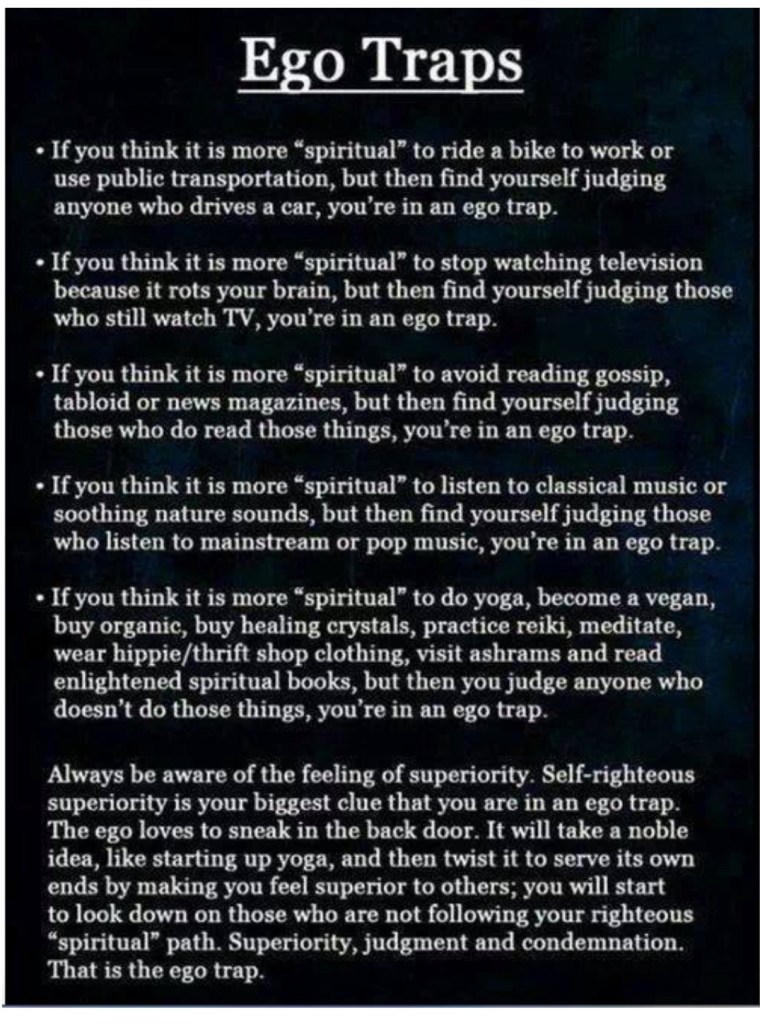Note to reader: this article makes reference to trauma and difficult experiences. Always contact your healthcare team if you’re worried about your well-being.
When we invest energy in living spiritually and we do this with self-awareness and compassionate self-reflection, this can be a meaningful pathway to spiritual intelligence (SQ).
Doing our own shadow work is key to this, such as exploring all sides of who we are and having a healthy approach to managing intense emotions like fear and shame. When we do the work of recognising our motivations for how we behave, and know the impact of those behaviours, this can be a core part of spiritual living – and is an ongoing process.
However, just because someone engages in different spiritual practices, doesn’t mean they’re living spiritually.
The term spiritual bypassing is used to describe the way a person may immerse themselves in spiritual beliefs or rituals as a way to avoid their personal problems, particularly emotional or psychological wounds. The term was first introduced in 1984 by John Welwood, a Buddhist teacher and psychotherapist.
People who use spiritual bypassing as a coping mechanism may not realise at first that they’re doing this, believing they are living – and loving – spiritually. They may still be able to use a spiritual path as a gateway to healing, ultimately navigating difficult experiences; in other words, this is not always a “bad” thing as long as they’re not hurting themselves or others.
However, if the interest in spiritual work is relied on only to hide from emotional pain, trauma or the past, it’s potentially spiritual bypassing. It can also become more sinister when “being spiritual” is focused solely on protecting the ego with damaging displays of power and control. This can include trying to scare or intimidate others.

To reiterate, not all spiritual bypassing is unhealthy. Some people may find an element of spiritual bypassing helpful as a short-term solution to their distress, even finding solace in it; some researchers even argue that it’s sometimes a natural part of early spiritual development. Those who use it as a coping mechanism may come to realise that they are engaging in avoidance behaviours and are able to find their way forward from their experiences, particularly where a teacher recognises what is happening and steers them towards realigning their mind, body and soul. This can take time; healing takes as long as it takes.
However, particularly where a focus on spirituality is driven by protecting the ego – which can manifest as dominance-based behaviours – it can be damaging, both for the individual and those in their orbit. Being around someone who behaves self-righteously, insists on telling others what they “should” do, is controlling or implies superiority, eg. that they’re more important than everyone else, can be annoying at best and intimidating at worst.
In a similar way, someone who frames their life experiences as a “lesson” from the Universe, as if receiving some form of celestial “punishment” for a perceived misdemeanour, then still won’t do the work of acknowledging or processing the impact of that, can also be a sign of spiritual bypassing. (I don’t buy the “lesson” narrative, although society readily endorses it; more on that later.)
Some may even use their version of spirituality to avoid accountability for their own actions and decision making, while at the same time trying to “convert” people and, just as harmfully, telling them they “deserve” their pain too.
This is not spiritual living.
In fact, these behaviours may eventually create feelings of resentment, as well as showing up as tension in the physical body.
In the end, someone may become incredibly disappointed if, after the initial euphoria of having “found” something they thought would help them cope, they realise it didn’t provide the solace they needed because the approach they were using wasn’t spiritual at all.
This is why, when learning about spiritual living, it’s important to have an ethical teacher or advisor who understands boundaries, spiritual bypassing and when someone is “using” rituals, practices and their beliefs as a crutch. When faith fails, it can be devastating.
Ego Traps
It’s important to emphasise that someone may not realise they are doing this initially, especially if they’ve fallen into an ego trap, and where the initial elation of being part of a community or belief system felt liberating.

However, over time they may realise that they have carried their problems with them, maybe even buried them, and this can deliver a heavy blow.
By the way, even some teachers are spiritually bypassing – some are definitely not all “love and light” no matter how they sign off their emails.
What to look out for:
1. Harmful behaviours, like avoidance or control. This happens for a number of reasons but in the context of spiritual bypassing is present when someone cannot get in touch with emotions or it’s difficult to manage or express them helpfully, and then uses spiritual practices or beliefs as a distraction or excuse. While this may feel appropriate at the time it may be problematic – eg. if it’s just kicking the can down the road to deal with a problem another day.
Speaking to someone trustworthy can help navigate tricky thoughts, feelings and behaviours, as can developing a toolkit that might include mindfulness and meditation. This can help a person become more self-aware and boost emotional intelligence (EQ) and SQ.
2. Clouded intuition might happen where red flags from a person’s history show up as hyper-vigilance around certain people, but they mistake it for tuning into someone’s energy. For example, we might feel a bit prickly around someone new, tell ourselves they’re shifty but the person may actually be reminding us on a subconscious level of someone else from the past – which activates that red flag.
We may even start to see threat everywhere, even where there is none. That doesn’t mean we should ignore it, but this is why it’s so important to be able to distinguish from a thought and a feeling – to hone our intuition, and establish the difference between anxiety and a sense of knowing. Being able to determine which is which is key to SQ; practice makes peaceful.
3. Fear-based narratives can take many forms but in the context of working with Spirit for example, I’ve seen people endorse narratives about demons and evil entities, even suggesting they can infest dreams – a view I do not endorse. (There are many reasons we have nightmares, demons aren’t one of them).
In fact, this type of commentary only serves to keep others afraid, as well as stuck and compliant; as I’ve said before (after literally a lifetime so far in this arena), we have more to be scared of from the living than the dead. That doesn’t mean we can’t be impacted by “negative” energy, and this is why self-care counts. But if it’s a commentary used to control or manipulate others, it’s not spiritual living.
4. Victim blaming is erroneously telling someone they are responsible for the harm others did; this usually shows up as telling someone they “needed” a “lesson”.
But no one “needs” awful things to happen to them in order for them to be better people; they were most likely already decent humans before that happened. They didn’t “sign up” for lessons and this is a common (western) misinterpretation of karma.
The victim blaming narrative can be harmful on many levels, not least of all because it takes the focus off the perpetrator of those harms – who should stop – and fails to hold the harm-doer accountable. It also falsely implies the victim is somehow the “cause” of their trauma, creating a smoke screen for the perpetrator to continue.
Be aware of how this might show up in dialogue and the harm it can do to both yourself and others who have been through something difficult, even potentially exacerbating the pain. No one “deserves” something traumatic; the only person responsible for the harm caused is the harm-doer.
5. Ego-driven intentions are where a person is using spirituality as a cloak to boost their sense of importance or to protect the identity they’ve created for themselves. This is particularly the case where people are not open to receiving feedback, are trying to maintain the status quo and may even willingly show signs of superiority.
I was once exhibiting at an MBS fair, when a woman started to “cold read” me; she didn’t know anything about me and I hadn’t consented to the reading. (This is a massive no-no in spiritualist circles, you always ask permission to pass on information). Her commentary was intrusive, a boundary violation and quite oppressive, very much rooted in her own mindset and she then went on to do the same to others at the show. Before long it became clear that the messages she was “receiving”, were actually thought-based and for herself, possibly rooted in her own fears and to protect the “talent” she thought she had. Entitlement also plays a part here; some people (wrongly) think they have the right to tell you what they think, whether you want to hear it or not.
Equally, if you know someone who tends to blame, shame or judge people or draws thick lines of rightness and wrongness that are divisive and rigid – eg. “its my way or no way” under the banner of divine guidance, it’s more likely spiritual bypassing and definitely not spiritual living.
If any of the above connects, you may find it helpful to find someone who can help professionally or reach into a friend, especially for help managing tricky thoughts and emotions. When we do the work and really know our ourselves including our intentions, it becomes part of an empowering spiritual journey. Take your time, be open to possibility and keep compassion – both for yourself and others – at the heart of what you do.
Delphi is the author of Answers In The Dark: Grief, Sleep and How Dreams Can Help You Heal, out now on Amazon and Hive. You might also like Monday Mojo™. The Helping You Sparkle™ magazine is part of the Helping You Sparkle™ portfolio. References to third parties does not endorse their content. Please read these policies for details.
© Delphi Ellis 2024 – please note this content may also appear elsewhere as promotional material for Answers In The Dark.

One thought on “What is Spiritual Bypassing?”
Comments are closed.